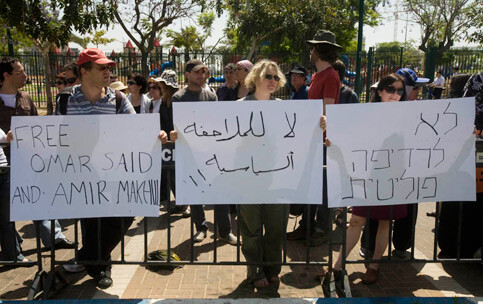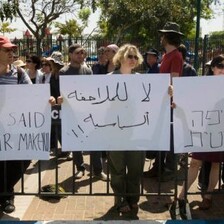The Electronic Intifada 14 May 2010

Activists protest outside Ameer Makhoul’s hearing at a Petach Tikvah court. (Oren Ziv/ActiveStills)
The recent arrest of two respected public figures from Israel’s Palestinian Arab minority in nighttime raids on their homes by the Shin Bet secret police — brought to light this week when a gag order was partially lifted — has sent shock waves through the community.
The arrests are not the first of their kind. The Shin Bet has been hounding and imprisoning politicians and intellectuals from the country’s Palestinian minority, a fifth of the population, since the birth of the Jewish state more than six decades ago. Currently, two MPs from Arab political parties, as well as the leader of the popular Islamic Movement, are facing trials.
But the detention of Ameer Makhoul and Omar Said is seen differently — as the gathering storm clouds in a political climate already fiercely hostile to its Palestinian citizens.
Mohammed Zeidan, the head of the Human Rights Association in Nazareth, said: “We are used to our political leaders being persecuted but now the Shin Bet is turning its sights on the leaders of Palestinian civil society in Israel, and that’s a dangerous development.”
Makhoul and Said are not accused of the usual public order offenses, nor have they simply violated chauvinistic legislation that criminalizes Palestinian citizens’ visits to neighboring Arab states. Both are facing the much more serious charge of espionage, on behalf of Lebanon’s Hizballah.
Makhoul, who appears to be the chief object of the Shin Bet’s interest, is the head of Ittijah, an umbrella organization coordinating the activities of Palestinian human rights groups in Israel. More specifically, he has become the leading voice inside Israel backing the growing international campaign for boycott, sanctions and divestment against Israel.
On Wednesday, the courts approved an extension of Makhoul’s remand. He was not allowed to be present and was denied the right to a lawyer until at least next Monday, 12 days since his arrest. He is reportedly being interrogated around the clock.
Said, an activist with the Tajamu political party and a scientist who specializes in developing new medicines from Middle Eastern plants, has been held by the Shin Bet since 24 April.
Amnesty International has threatened to declare Makhoul a “prisoner of conscience,” saying his arrest “smacks of pure harassment, designed to hinder his human rights work.”
Observers from the Palestinian minority too have ridiculed the allegations, based on secret evidence, that the pair made “contact with a foreign agent.” They point out that under the draconian emergency regulations being used in this case the Shin Bet needs only the flimsiest circumstantial evidence to lay such a charge.
Zeidan called it an easy, “one size fits all” security offense that was difficult to challenge but persuasive to the Jewish majority. “You only need unwittingly to meet at a conference a relative of a relative of someone in Hizballah and the Shin Bet thinks it has grounds to arrest you.”
The Palestinian minority is not alone in believing that Makhoul and Said have not spied in the accepted sense of passing classified or sensitive information to an enemy: Israel’s military correspondents have been largely dismissive of the espionage charges too. In the Israeli daily Haaretz, Amos Harel and Avi Issacharoff pointed out that neither Palestinian citizen is privy to secrets that would interest Hizballah.
Instead, the correspondents hinted at other motives behind the arrests. Any contacts between Israel’s enemies such as Hizballah and Palestinian rights activists in Israel are a threat, they surmise, because Palestinian leaders in Israel might offer assistance in “coordinating political positions” or initiate “protests and riots during sensitive periods.” That radically expands the traditional definition of “espionage.”
The Shin Bet’s pursuit of Makhoul and Said, in the view of community leaders, needs to be understood in terms of a fixed assumption by the Israeli establishment that the Arab minority poses a political threat to the continued survival of a Jewish state.
The roots of this worldview can be traced back to the signing of the Oslo accords. With the launch of a peace process with the Palestinians, Israeli politicians began to reconsider the status of the large Palestinian minority. Many believed that allowing a significant population of Palestinians to remain inside Israel as citizens after the creation of a neighboring Palestinian state might one day prove to be the country’s Achilles’ heel.
Might not the Palestinian minority provide the Palestinians in the occupied territories with a “foot in the door” to try to win back the whole of historic Palestine rather than settle for a mini-state in the West Bank and Gaza?
Those fears escalated dramatically when Oslo turned sour and the second Palestinian intifada erupted in 2000. Israel believed the Palestinians had refused its “generous” offer at Camp David in the hope that they could use the Palestinian minority as a “Trojan horse” to destroy the Jewish state demographically from within.
Ehud Barak, the prime minister at the time, called the Palestinian minority the “spear point” of what he believed was Palestine Liberation Organization Chairman Yasser Arafat’s attempt to dismantle Israel as a Jewish state. He feared that a political reform program demanding a “state of all its citizens,” which had become a rallying cry for Palestinian citizens, was really intended to bring the return of millions of Palestinian refugees under cover of an equal rights struggle.
Israel responded by making contact all but impossible between Palestinians in Israel and those in the occupied territories, including by building a wall around the West Bank and legislating an effective ban on marriages across the Green Line boundary between Israel and the West Bank and Gaza Strip.
Perhaps not surprisingly, the Shin Bet’s chief target prior to the latest arrests was Azmi Bishara, the architect of the “state of all its citizens” campaign. In 2007 Bishara was accused of spying for Hizballah too, and has been in exile ever since.
At that time, Yuval Diskin, the head of the Shin Bet, warned that he regarded it as his job to “thwart” any activities, including political ones, that threatened Israel’s survival as a Jewish state.
According to Zeidan and other analysts, the Shin Bet’s hand in the latest arrests appears to be guided by a similar assessment that the Palestinian minority is again posing an “existential threat” to Israel — even if for different reasons.
Makhoul is seen as at the figurehead of an emerging movement inside Israel that, faced with the refusal of Israelis to countenance political reforms to democratize the country, is devising new political strategies.
He has not hidden the extensive contacts he has developed both among western Palestinian solidarity activists and in the Arab world, urging the need for a boycott of Israel. He was also at the forefront of the protests inside Israel against its attack on Gaza last year. He was called in for interrogation by the Shin Bet at the time.
“The occupation isn’t news anymore,” Zeidan said. “The big threats facing Israel, in the Shin Bet’s view, are its deteriorating image in terms of human rights and the growing sense abroad that it is an apartheid state.
“Palestinian civil society in Israel, more so even than our political parties, is best placed to make the case on those issues to the international community, to expose the racism and discrimination inherent in a Jewish state. Ameer Makhoul’s arrest should be understood in that light.
“The Shin Bet believes we have crossed a red line in our international advocacy.”
Jonathan Cook is a writer and journalist based in Nazareth, Israel. His latest books are Israel and the Clash of Civilisations: Iraq, Iran and the Plan to Remake the Middle East (Pluto Press) and Disappearing Palestine: Israel’s Experiments in Human Despair (Zed Books). His website is www.jkcook.net.
A version of this article originally appeared in The National (www.thenational.ae), published in Abu Dhabi, and is republished with the author’s permission.





